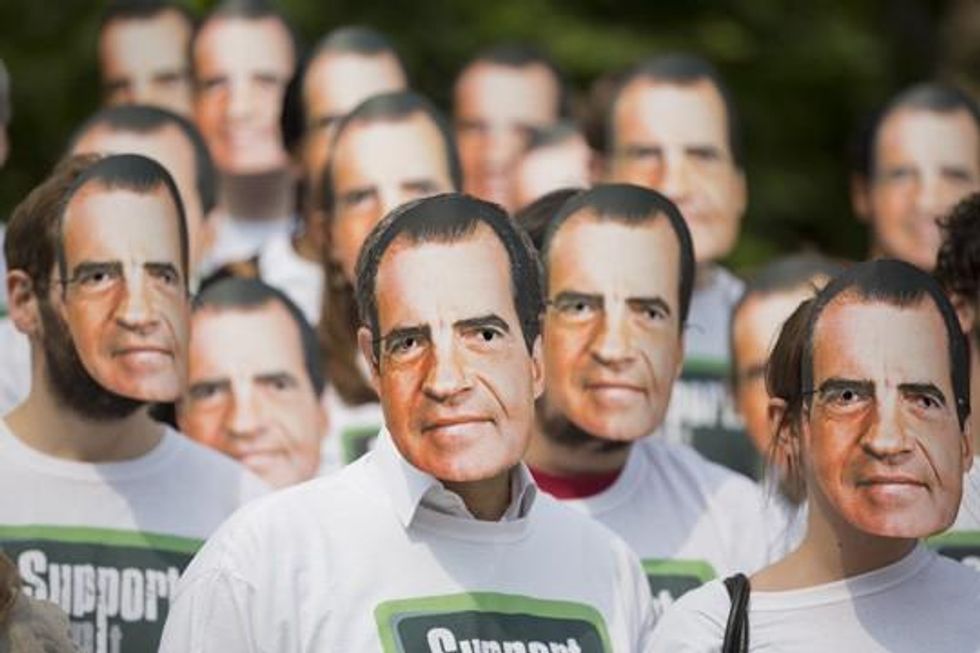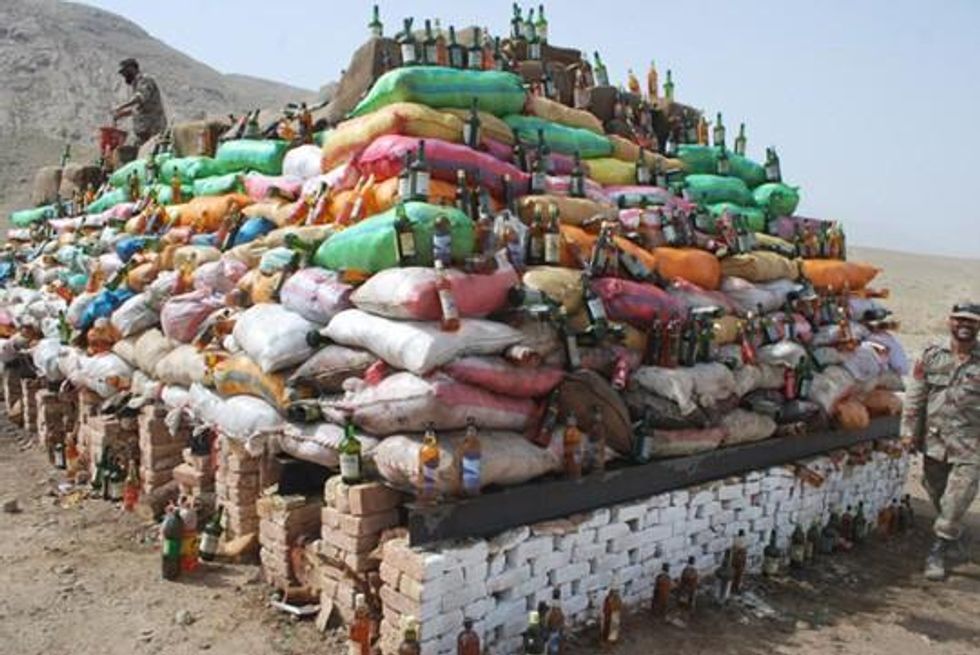

SUBSCRIBE TO OUR FREE NEWSLETTER
Daily news & progressive opinion—funded by the people, not the corporations—delivered straight to your inbox.
5
#000000
#FFFFFF
To donate by check, phone, or other method, see our More Ways to Give page.


Daily news & progressive opinion—funded by the people, not the corporations—delivered straight to your inbox.

For more than 40 years, the international community has waged a misguided war against drug use that has done little more than make illegal drugs a multi-billion dollar global industry and contribute to the deaths of literally millions of drug users. Simply put, the war on drugs kills people who use drugs.
On June 26 each year, the United Nations marks the International Day Against Drug Abuse and Illicit Trafficking. This year, we are making it a day against the abuse of drug users by marking the start of the Support Don't Punish campaign to encourage governments to end the war on drugs that fuels the HIV, tuberculosis and hepatitis epidemics, violates human rights and fails to actually tackle the world's drug problem.
What is it about drugs and drug use that has led to this almost universal disapproval? India is a country of over a billion people, a good number of whom have used drugs in some form at some point in their lives. Are they all criminals? Our government certainly thinks so, as do most of the world's governments. Some even consider drug use a criminal offense punishable by death.
Some drug use has always been part of our social and religious culture but it has only been in the last hundred years or so that we have seen the steady tightening of controls on drugs and drug use. The price of this war however is not simply the cost of enforcement and incarceration.
Globally, the HIV and hepatitis C epidemics are fueled by the criminalization of people who use drugs. Of the 16 million people who inject drugs worldwide, around three million are living with HIV and two thirds are living with hepatitis C. Even though one third of all HIV infections outside of sub-Saharan Africa are among people who inject drugs and even though the evidence of this is quite clear, the necessary funding for specialist prevention services has not followed.
While HIV prevalence in people who inject drugs is 24 times that of the general population in India, less than 3% of the $820 million invested by the Global Fund here in HIV programming so far supports them. While our friends at the Global Fund understand the value of such investments, it's often difficult for countries to get the political support needed to address HIV risk in the context of drug use due to its criminalization. This dynamic fuels a vicious cycle of neglect.
Criminalization undermines the effectiveness of the HIV response. In India and elsewhere, we need to scale up evidence-based HIV prevention measures for people who inject drugs. The Support Don't Punish campaign calls for the removal of legal sanctions on low-level drug offenses and for the scale-up of scientifically proven health interventions, including a package of "harm reduction" services fully endorsed by the World Health Organization, UNAIDS, and the United Nations Office on Drugs and Crime. This includes interventions to prevent the sharing of injecting equipment like needle and syringe exchange and effective programs for those with drug dependency problems, such as opioid substitution therapy.
Rather than demonizing people who use drugs, we should humanize them. Rather than jailing them, we should get them the treatment they need. Rather than punishing them, we must support them. We need to end the war on drugs and make our priority the well-being of people who use drugs, their families and communities.

Dear Common Dreams reader, The U.S. is on a fast track to authoritarianism like nothing I've ever seen. Meanwhile, corporate news outlets are utterly capitulating to Trump, twisting their coverage to avoid drawing his ire while lining up to stuff cash in his pockets. That's why I believe that Common Dreams is doing the best and most consequential reporting that we've ever done. Our small but mighty team is a progressive reporting powerhouse, covering the news every day that the corporate media never will. Our mission has always been simple: To inform. To inspire. And to ignite change for the common good. Now here's the key piece that I want all our readers to understand: None of this would be possible without your financial support. That's not just some fundraising cliche. It's the absolute and literal truth. We don't accept corporate advertising and never will. We don't have a paywall because we don't think people should be blocked from critical news based on their ability to pay. Everything we do is funded by the donations of readers like you. Will you donate now to help power the nonprofit, independent reporting of Common Dreams? Thank you for being a vital member of our community. Together, we can keep independent journalism alive when it’s needed most. - Craig Brown, Co-founder |

For more than 40 years, the international community has waged a misguided war against drug use that has done little more than make illegal drugs a multi-billion dollar global industry and contribute to the deaths of literally millions of drug users. Simply put, the war on drugs kills people who use drugs.
On June 26 each year, the United Nations marks the International Day Against Drug Abuse and Illicit Trafficking. This year, we are making it a day against the abuse of drug users by marking the start of the Support Don't Punish campaign to encourage governments to end the war on drugs that fuels the HIV, tuberculosis and hepatitis epidemics, violates human rights and fails to actually tackle the world's drug problem.
What is it about drugs and drug use that has led to this almost universal disapproval? India is a country of over a billion people, a good number of whom have used drugs in some form at some point in their lives. Are they all criminals? Our government certainly thinks so, as do most of the world's governments. Some even consider drug use a criminal offense punishable by death.
Some drug use has always been part of our social and religious culture but it has only been in the last hundred years or so that we have seen the steady tightening of controls on drugs and drug use. The price of this war however is not simply the cost of enforcement and incarceration.
Globally, the HIV and hepatitis C epidemics are fueled by the criminalization of people who use drugs. Of the 16 million people who inject drugs worldwide, around three million are living with HIV and two thirds are living with hepatitis C. Even though one third of all HIV infections outside of sub-Saharan Africa are among people who inject drugs and even though the evidence of this is quite clear, the necessary funding for specialist prevention services has not followed.
While HIV prevalence in people who inject drugs is 24 times that of the general population in India, less than 3% of the $820 million invested by the Global Fund here in HIV programming so far supports them. While our friends at the Global Fund understand the value of such investments, it's often difficult for countries to get the political support needed to address HIV risk in the context of drug use due to its criminalization. This dynamic fuels a vicious cycle of neglect.
Criminalization undermines the effectiveness of the HIV response. In India and elsewhere, we need to scale up evidence-based HIV prevention measures for people who inject drugs. The Support Don't Punish campaign calls for the removal of legal sanctions on low-level drug offenses and for the scale-up of scientifically proven health interventions, including a package of "harm reduction" services fully endorsed by the World Health Organization, UNAIDS, and the United Nations Office on Drugs and Crime. This includes interventions to prevent the sharing of injecting equipment like needle and syringe exchange and effective programs for those with drug dependency problems, such as opioid substitution therapy.
Rather than demonizing people who use drugs, we should humanize them. Rather than jailing them, we should get them the treatment they need. Rather than punishing them, we must support them. We need to end the war on drugs and make our priority the well-being of people who use drugs, their families and communities.


For more than 40 years, the international community has waged a misguided war against drug use that has done little more than make illegal drugs a multi-billion dollar global industry and contribute to the deaths of literally millions of drug users. Simply put, the war on drugs kills people who use drugs.
On June 26 each year, the United Nations marks the International Day Against Drug Abuse and Illicit Trafficking. This year, we are making it a day against the abuse of drug users by marking the start of the Support Don't Punish campaign to encourage governments to end the war on drugs that fuels the HIV, tuberculosis and hepatitis epidemics, violates human rights and fails to actually tackle the world's drug problem.
What is it about drugs and drug use that has led to this almost universal disapproval? India is a country of over a billion people, a good number of whom have used drugs in some form at some point in their lives. Are they all criminals? Our government certainly thinks so, as do most of the world's governments. Some even consider drug use a criminal offense punishable by death.
Some drug use has always been part of our social and religious culture but it has only been in the last hundred years or so that we have seen the steady tightening of controls on drugs and drug use. The price of this war however is not simply the cost of enforcement and incarceration.
Globally, the HIV and hepatitis C epidemics are fueled by the criminalization of people who use drugs. Of the 16 million people who inject drugs worldwide, around three million are living with HIV and two thirds are living with hepatitis C. Even though one third of all HIV infections outside of sub-Saharan Africa are among people who inject drugs and even though the evidence of this is quite clear, the necessary funding for specialist prevention services has not followed.
While HIV prevalence in people who inject drugs is 24 times that of the general population in India, less than 3% of the $820 million invested by the Global Fund here in HIV programming so far supports them. While our friends at the Global Fund understand the value of such investments, it's often difficult for countries to get the political support needed to address HIV risk in the context of drug use due to its criminalization. This dynamic fuels a vicious cycle of neglect.
Criminalization undermines the effectiveness of the HIV response. In India and elsewhere, we need to scale up evidence-based HIV prevention measures for people who inject drugs. The Support Don't Punish campaign calls for the removal of legal sanctions on low-level drug offenses and for the scale-up of scientifically proven health interventions, including a package of "harm reduction" services fully endorsed by the World Health Organization, UNAIDS, and the United Nations Office on Drugs and Crime. This includes interventions to prevent the sharing of injecting equipment like needle and syringe exchange and effective programs for those with drug dependency problems, such as opioid substitution therapy.
Rather than demonizing people who use drugs, we should humanize them. Rather than jailing them, we should get them the treatment they need. Rather than punishing them, we must support them. We need to end the war on drugs and make our priority the well-being of people who use drugs, their families and communities.
